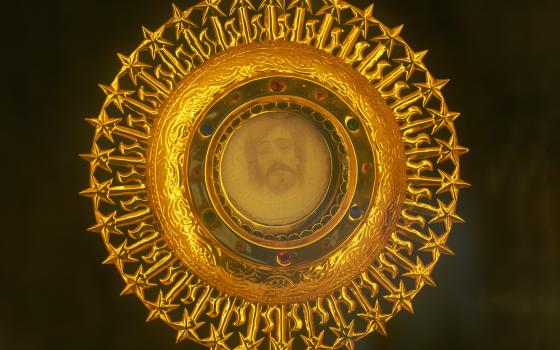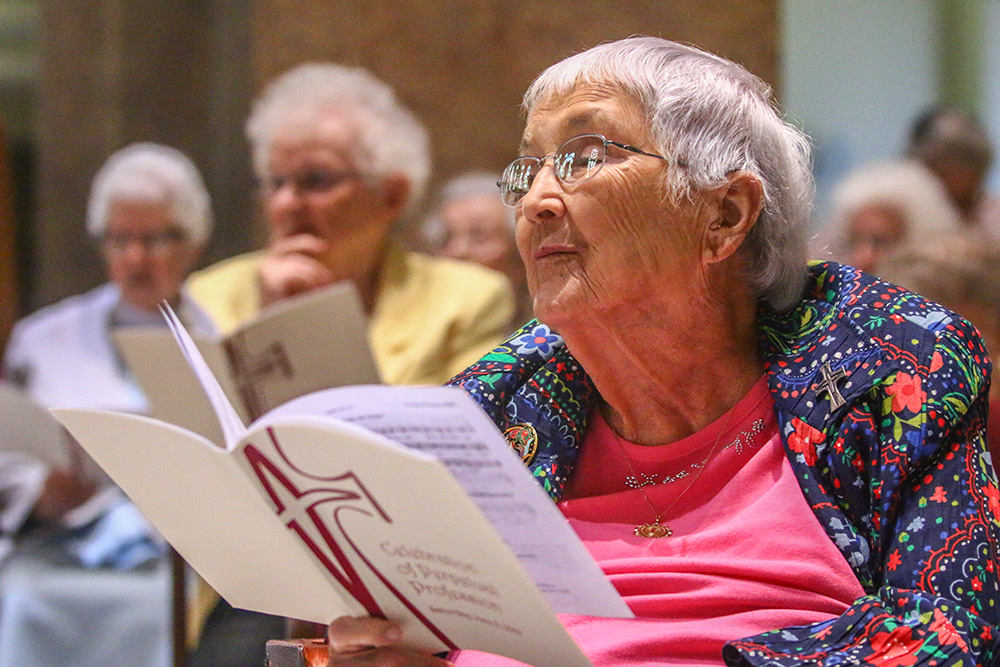
Mercy Sr. Theresa Kane in June 2019 during a liturgy when four Mercy sisters professed their perpetual vows. Kane, who fought for decades for the equality of women in the Catholic Church — famously publicly challenging the pope on the issue in 1979 — died Aug. 22 at age 87. (Courtesy of the Sisters of Mercy of the Americas)
Mercy Sr. Theresa Kane, who fought for decades for the equality of women in the Catholic Church — famously publicly challenging the pope on the issue — died Aug. 22. She was 87.
Kane's congregation, the Sisters of Mercy of the Americas, announced her death.
Kane served for seven years in leadership of what was then the New York Province of the Sisters of Mercy, before being elected in 1977 as president of the Religious Sisters of Mercy of the Union, a union of nine provinces that would eventually join 16 other Mercy congregations to become the Sisters of Mercy of the Americas. The next year, in 1978, she became president of the Leadership Conference of Women Religious (LCWR).
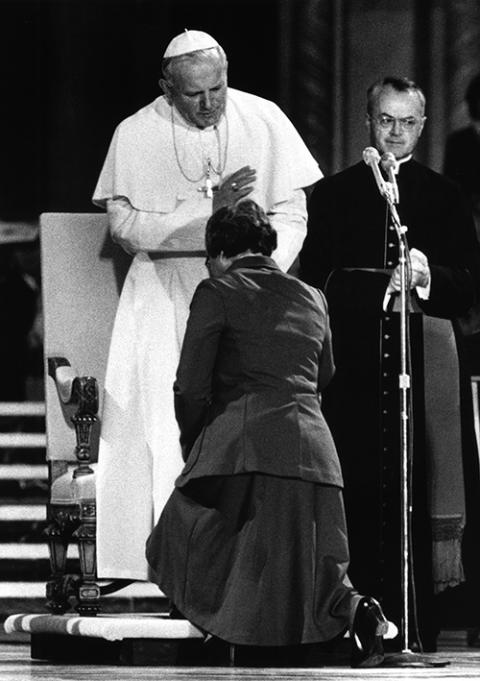
Pope John Paul II blesses Mercy Sr. Theresa Kane at the Basilica of the National Shrine of the Immaculate Conception in Washington in 1979. Earlier in the service, Kane had challenged the pope to include women in all ministries of the church. (CNS)
That position gave her the honor of what would become Kane's signature public moment: greeting Pope St. John Paul II during his visit to the United States in 1979. During her remarks, which were televised and before an audience of 5,000 sisters, Kane told the pope, "The church, in its struggle to be faithful to its call for reverence and charity for all persons, must respond by providing the possibility of women as persons being included in all the ministries of our church."
Her comments ignited a firestorm of controversy and, along with other actions, eventually led to efforts by the Vatican to remove her from office.
"Theresa's ministry was about truth-speaking," Sr. Susan Sanders, president of the Sisters of Mercy of the Americas, said in a written statement announcing Kane's death. "Straightforward and bold as Theresa was, however, she spoke truth as her God and prayer revealed it to her, and not from a place of position or judgment or blame, but from a place of love, respect, humility, and inclusion. For this, many deeply loved and admired her."
LCWR officials said in a written statement that Kane's challenge highlighted an issue most wanted to avoid.
"Her action made an undeniably important contribution — it focused worldwide attention on the crucial question of the rights of women," the statement said. "Over the years since that time, Sister Theresa gave her life's energies, time, and skills to fostering religious life, creating peace, and working for the rights of women and the rights of people who are impoverished."
She was born Margaret Kane on Sept. 24, 1936, in the Bronx, New York, to immigrant Irish parents — one of seven children. She entered the Sisters of Mercy in Tarrytown, New York, in 1955, making her first profession in 1957 and professing perpetual vows in 1960.
Advertisement
Kane earned degrees in economics and finance from Manhattanville College before pursuing master's degrees in public administration from New York University and women's history from Sarah Lawrence College.
Serving as finance manager at St. Francis Hospital in Port Jervis, New York, when the hospital administrator died unexpectedly, Kane became chief executive officer of the hospital at age 27. Displaying exceptional leadership qualities at such a young age, she stepped into the role of councilor and secretary for the Sisters of Mercy New York Province two years later.
A founding member of the Intercommunity Center for Justice and Peace, New York, Kane also ministered as a campus minister, formation director and motherhouse administration, in addition to serving as the U.S. representative to the International Union of Superiors General.
In 2004, Kane received LCWR's Outstanding Leadership Award, and received the Lifetime Achievement Award from Mercy College (now Mercy University) in Dobbs Ferry, New York, in 2015, among other accolades.
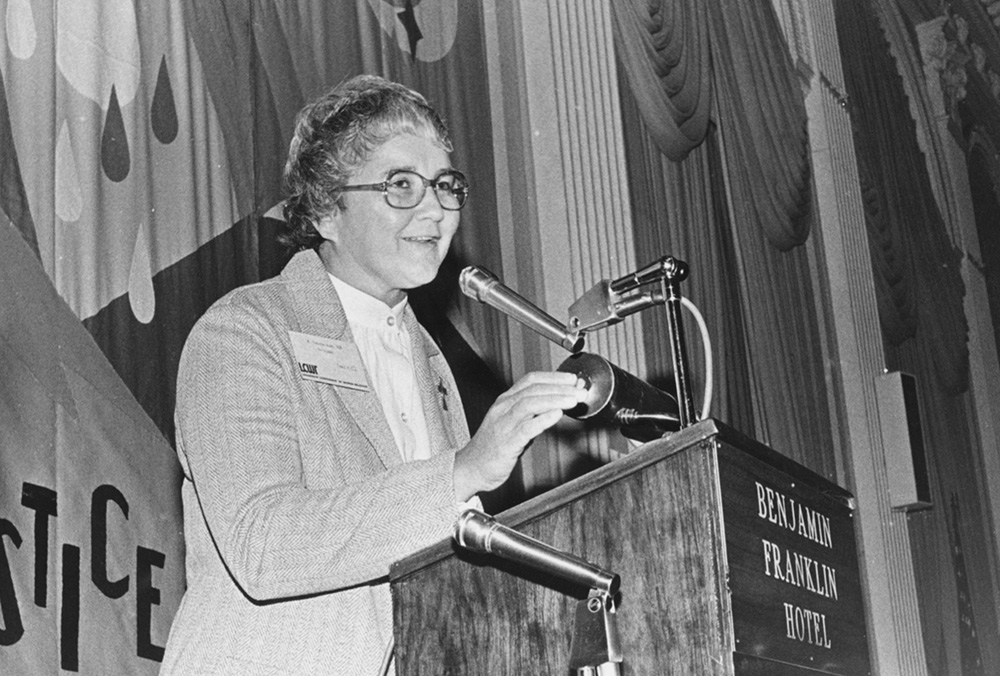
Mercy Sr. Theresa Kane, then president of the Leadership Conference of Women Religious, addresses the organization's assembly in Philadelphia in August 1980. (NCR photo/Mary Bader Papa)
She appeared in the documentary "Band of Sisters" in 2012, and, the following year, in the PBS series "Makers: Women Who Make America." She also served on the board of National Catholic Reporter.
In 2019, Kane was the subject of the biography "To Speak the Truth in Love," by Sr. Christine Schenk, of the Congregation of St. Joseph.
"I admired her so much," Schenk told Global Sisters Report. "She was a real mentor for me way before I ever did her book."
Schenk said that Kane's moment confronting the pope gets all the attention, but just as important are the decades of work she did to advance the cause of women in the church, and that Kane was a strong advocate for LGBTQ rights in the church.
"She was implementing the chapter directives of her own congregation and position papers by LCWR," Schenk said. "She's portrayed as this rogue nun out there, and that couldn't be further from the truth."
Chapter directives were also what led to Mercy sisters working with bishops to develop a pastoral approach to tubal ligations for Mercy hospitals rather than simply a strict prohibition. Those efforts led to years of back and forth with the Vatican, Schenk said, and then efforts by bishops in Rome and the United States to remove Kane from office, but the Mercies stood firm behind her.
"She was a leader at a very difficult time," Schenk said. "But she was always about trying to bring people together."
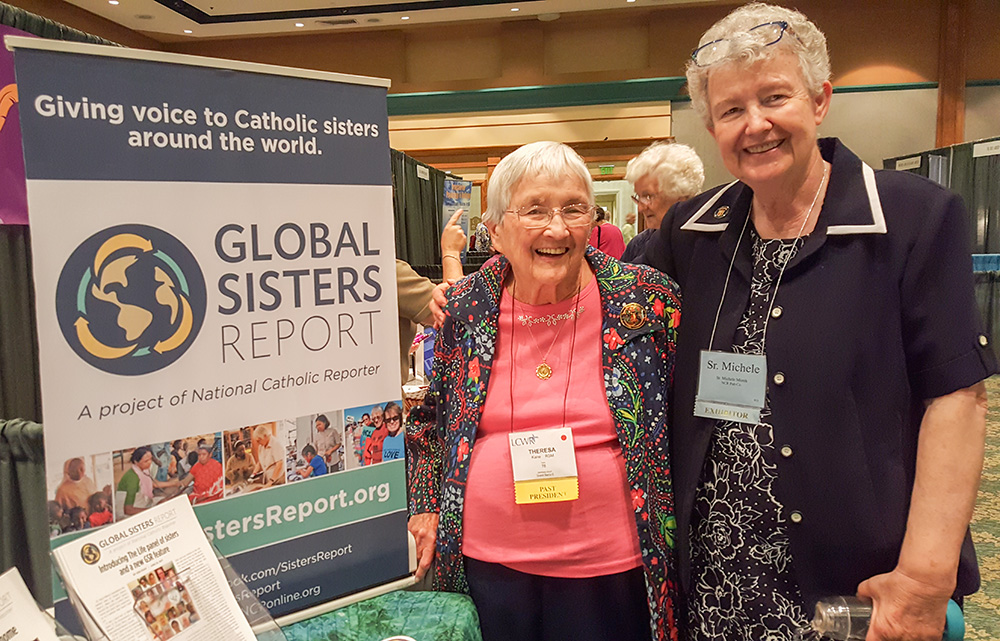
Mercy Sr. Theresa Kane with Ursuline Sr. Michele Morek, then sister-liaison for Global Sisters Report, at the 2017 Leadership Conference of Women Religious assembly (GSR photo/Gail DeGeorge)
The staff at WATER, a nonprofit educational center that focuses on feminist work in religion, called Kane a great woman and stalwart leader in a written statement. WATER stands for Women's Alliance for Theology, Ethics and Ritual.
"Her impact will be enduring, and not just because of what happened with the pope," said WATER co-director Mary Hunt, who knew and worked with Kane. "She told the truth and paid a price for it, but more importantly, she made change."
When Vatican officials asked Kane to clarify her remarks to the pope, giving her a chance to say that by "all the ministries of our church" she did not mean ordination for women, she instead asserted that was exactly what she meant.
"I wouldn't say she challenged the pope, but she spoke her truth in the presence of the pope," said Mercy Sr. Helen Marie Burns, who knew Kane for decades. "It was her custom and personality — she spoke directly and honestly."
The Women's Ordination Conference called her "an extraordinary woman, leader, friend, and visionary" in a written statement.
"She knew the power of her voice, spoke from her heart, and inspired generations to join her in the labor of realizing gender equality in our church and in our world," the statement said, and noted that in 2015 she told the conference that she is often asked if she would do it again, and she replied, "Most assuredly, yes, and I would express my plea with greater urgency and greater passion."
Burns said Kane never saw herself in competition with other women.
"She was able to encourage leadership around her," she said. "She wasn't threatened or felt any need to restrain the talents of those around her."
Many said Kane was known for her humor and being fun to be around, with Hunt saying Kane "came early and stayed late at parties."
Schenk said Kane always had a humorous take on things, had a gift for remembering details about your family, and that whatever the situation, it was never about her.
"It was about the cause. It was about the movement. It was about what needed to happen," Schenk said. "I'm going to miss her."
[GSR freelancer Julie Ferraro contributed to this report.]




